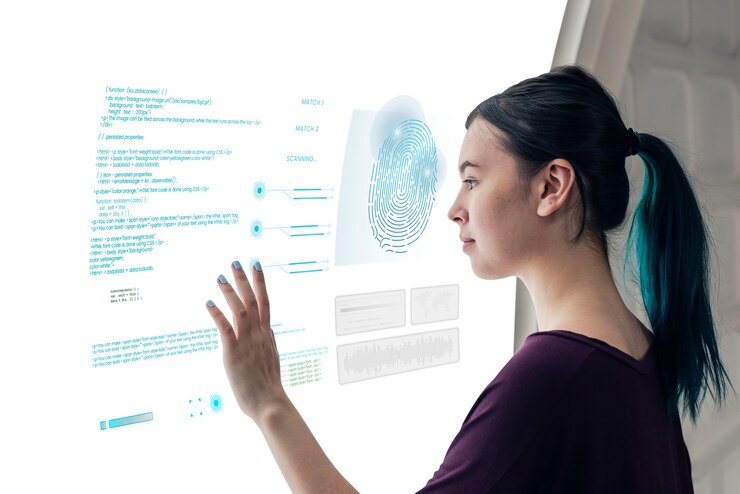Biometric approval is the process of using unique physical characteristics for authentication and access control. It includes fingerprint, facial or iris recognition to verify identity.
Biometric approval provides a high level of security and accuracy in identity verification, allowing for seamless and convenient access to secured systems or physical areas. This technology has become increasingly popular in various industries, including finance, healthcare, and government sectors.
With the rise of digital transformation, biometric approval offers a reliable solution for combatting identity fraud and unauthorized access. As the demand for secure identity verification grows, biometric approval is expected to play a crucial role in shaping the future of authentication and access control systems.

Introduction To Biometric Approval
Biometric approval is a process that uses unique physical or behavioral characteristics, such as fingerprints, facial recognition, or voice patterns, to confirm a person’s identity. In today’s digital world, biometric approval holds significant importance in various industries. Let’s delve into the definition and explore its relevance in modern times.
Definition Of Biometric Approval
Biometric approval refers to the verification of an individual’s identity using unique biological traits such as fingerprints, facial features, iris patterns, or voice recognition. It offers a highly secure and reliable method for confirming the identity of individuals in different applications, including access control, time and attendance tracking, and financial transactions.
Importance And Relevance In Today’s Digital World
Biometric approval has become increasingly relevant in today’s digital landscape due to the growing concerns about identity theft, fraud, and unauthorized access. Its adoption has significantly enhanced security measures in various sectors, including banking, healthcare, government services, and law enforcement. The seamless integration of biometric approval technologies has not only strengthened security protocols but has also improved user experience by offering a convenient and efficient means of identity authentication.
Types Of Biometric Approvals
Biometric approval refers to the use of biometric data for verifying the identity of an individual for security or authentication purposes. It involves the unique biological characteristics of an individual, such as their fingerprints, facial features, or retinal patterns, to grant access or approval for certain actions or permissions.
Fingerprint Recognition
Fingerprint recognition is one of the most commonly used biometric approval methods. This technology captures and analyzes the unique patterns of ridges and valleys on an individual’s fingertip to authenticate their identity. It is widely used in access control systems, mobile devices, and identification processes.
Facial Recognition
Facial recognition technology relies on analyzing an individual’s facial features, such as the distance between their eyes, nose, and mouth, to verify their identity. This type of biometric approval is used in surveillance systems, smartphone unlocking, and airport security for identity verification.
Retinal Scanning
Retinal scanning is a highly secure form of biometric approval that captures the unique patterns of blood vessels at the back of an individual’s retina. This technology is used in high-security environments, such as government facilities, laboratories, and financial institutions, where stringent identity verification is essential.
Applications Of Biometric Approval
Security And Access Control
Biometric approval has widespread applications in providing enhanced security and access control. By using unique physiological traits such as fingerprints, iris, or facial recognition, organizations can effectively manage and restrict access to sensitive areas, data, or assets. This technology ensures that only authorized personnel can gain access, reducing the risk of unauthorized entry or potential security breaches.
Time And Attendance Tracking
One of the key applications of biometric approval is in time and attendance tracking. By utilizing biometric data, organizations can accurately record and track employee attendance, eliminating the possibility of time theft or fraudulent practices. This technology not only facilitates efficient payroll management but also ensures the integrity and reliability of attendance records.
Financial Transactions
In the realm of financial transactions, biometric approval plays a crucial role in enhancing security and authenticity. By incorporating biometric authentication methods such as fingerprint or facial recognition, financial institutions can strengthen the verification process, ensuring that only the authorized individuals can initiate and authorize transactions. This significantly reduces the risk of fraudulent activities and unauthorized access to sensitive financial data.

Credit: m.youtube.com
Advantages Of Biometric Approval
Biometric approval is a process that uses unique physical or behavioral traits such as fingerprints, facial recognition, or voice patterns to verify a person’s identity. This technology has gained popularity due to its numerous advantages that enhance security, provide convenience and efficiency, and reduce fraud and identity theft.
Enhanced Security
Biometric approval significantly enhances security by providing a highly accurate and reliable method of verifying individuals’ identities. With traditional methods such as passwords or ID cards, there is always a risk of them being stolen or compromised. However, biometric traits are unique to each individual, making it nearly impossible for unauthorized individuals to access sensitive information or restricted areas.
Convenience And Efficiency
One of the key advantages of biometric approval is the convenience and efficiency it offers. Users no longer need to remember complex passwords or carry multiple identification cards. Biometric verification is quick and seamless, saving time and streamlining processes. Whether it’s accessing a building, logging into a device, or making a payment, biometric approval offers effortless and rapid identification.
Reduction Of Fraud And Identity Theft
By utilizing biometric traits, organizations can significantly reduce instances of fraud and identity theft. As biometric information is inherently unique to each individual, it becomes extremely difficult for unauthorized individuals to impersonate someone else. This safeguard not only protects individuals and organizations from financial loss but also enhances overall trust in the security measures implemented.
Challenges And Concerns
Biometric approval systems have garnered widespread adoption due to their efficiency and reliability. However, along with their benefits, there are several challenges and concerns that need to be addressed in the adoption and implementation of biometric approval technology.
Privacy Issues
One of the primary concerns surrounding biometric approval is the issue of privacy. Biometric data, such as fingerprints, facial features, or iris scans, is highly sensitive and personal. If this data were to be compromised, it could lead to severe privacy breaches, identity theft, and potential misuse. Ensuring secure storage and encryption of biometric data is essential in safeguarding individuals’ privacy.
Accuracy And Reliability
The accuracy and reliability of biometric approval systems are crucial for their effectiveness. False positives and false negatives can lead to unauthorized access or denial of legitimate users. Factors such as environmental conditions, quality of biometric sensors, and variations in biometric traits can impact the accuracy of the system. It is imperative to continually improve the technology to minimize errors and enhance reliability.
Ethical And Societal Implications
The widespread implementation of biometric approval raises ethical and societal concerns. There is a need to address issues related to consent, transparency, and potential discrimination. Additionally, the reliance on biometric data for authentication can lead to social implications, including exclusion of individuals who may have difficulty providing biometric traits due to disabilities or other factors.
Frequently Asked Questions:
How Does Biometric Approval Work?
Biometric approval works by analyzing unique physical traits like fingerprints or facial features to verify identity. Once the biometric data is captured, it’s compared to stored records for authentication. If there’s a match, the approval process is granted.
What Is Biometric Verification?
Biometric verification is a way to confirm a person’s identity using their unique physical traits, such as fingerprints or facial features. It provides secure and accurate authentication for access control and identity verification purposes.
What Is Biometric Authorization?
Biometric authorization is a security process that uses unique physical characteristics, like fingerprints or facial features, for identity verification. It provides secure access to devices, systems, or locations by confirming a person’s identity through biological traits.
How Do I Register For Biometric Approval?
To register for biometric approval, visit the authorized center and provide necessary documents and personal information. Follow the instructions from the staff and complete the registration process.
Conclusion
Biometric approval offers a secure and efficient solution for verifying individuals’ identities. This technology provides a personalized and seamless experience for users while enhancing security measures. With its growing adoption across various industries, biometric approval is set to redefine the way we interact with technology, making our everyday experiences more convenient and secure.

